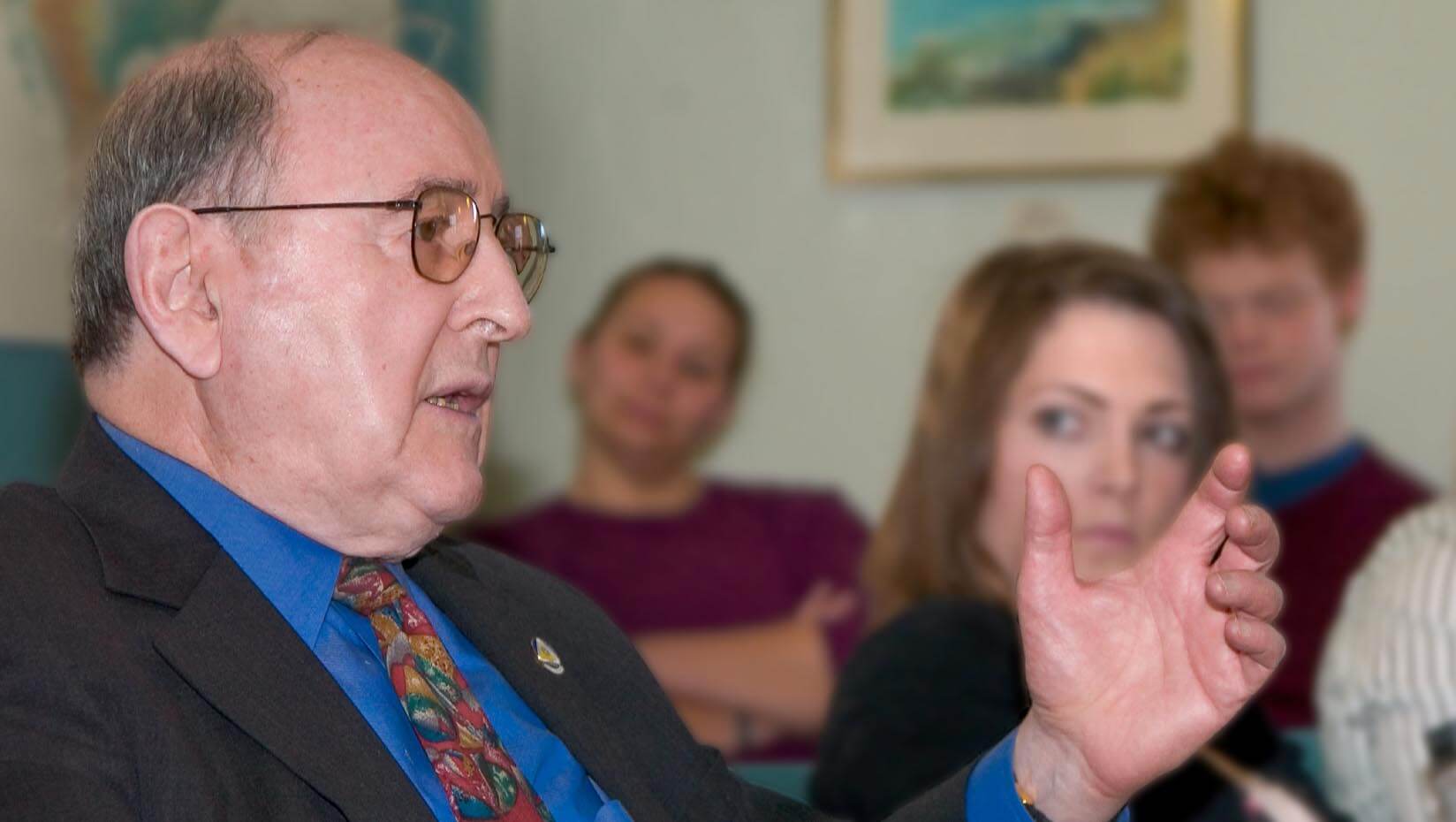
First-ever named professorship at Honors College created in honor of Bernard Lown (‘42)
A new series of courses and lectures at the University of Maine will honor the life and legacy of Dr. Bernard Lown (‘42). A devout humanitarian, Lown applied principles of peace and kindness to his work as a world-renowned cardiologist and activist for nuclear disarmament.
Through a gift of $273,000 from Lown’s three children — Anne, Fredric and Naomi Lown, the Dr. Bernard Lown ‘42 Honors College Teaching Professorship was established at the University of Maine Foundation as the first-ever named professorship in the Honors College. This endowed fund will support a UMaine faculty member working to advance and understand societal peace, health and justice in alignment with the lifelong commitments of Bernard Lown. The fund also provides the university with resources to recognize faculty members for their innovative teaching methods and creative activities.
“From the beginning, the Honors College has been a place for students to grow their knowledge, courage and passion,” said Ellen Weinauer, dean of the Honors College. “Dr. Lown found his love of science here and began thinking deeply about the world during his time in Honors. I’m grateful that Dr. Lown’s children have recognized the impact the Honors College had on their father in this way. The professorship established in Dr. Lown’s name will have a lasting impact on UMaine students, faculty and the Honors College.”

After a rigorous application and review process, Michael Haedicke, associate professor of sociology, was selected for the inaugural Dr. Bernard Lown ‘42 Honors College Teaching Professorship.
“Naomi, Fred and I were impressed with the diligence the Honors College displayed in selecting someone for this professorship,” Anne Lown said. “We were pleased that the six professors who applied were from a variety of disciplines, yet we could see the relevance to our father’s work and his values within all their fields of study.”
An immigrant from Lithuania who moved to Lewiston in 1935, Lown invented the direct current defibrillator in 1962. Throughout his career as a cardiologist, his approach to patient care was personable and humanistic. By the end of his medical career, he had become critical of the way doctors were extending and taught to extend patient care — more procedural than personal.
In the early ‘60s, as the threat of nuclear warfare became more prevalent during the Cold War, Lown founded Physicians for Social Responsibility. The group researched and published a paper in The New England Journal of Medicine that disproved the widely-held belief that bomb shelters could protect against nuclear war. It was one of 447 medical journal articles he authored and the beginning of work that would earn him a Nobel Peace Prize in 1985 alongside a Soviet cardiologist.
“Dr. Lown was not a sociologist, but the themes in his work and the passions that he pursued in his work are ones that connect with sociology,”
Michael Haedicke
Lown’s two-fold pursuit as a cardiologist and activist revolved around his concern for the state of the world and the issue of sudden death. He never sought fame or fortune, only to put his skill and knowledge toward the betterment of society.
“Dr. Lown was not a sociologist, but the themes in his work and the passions that he pursued in his work are ones that connect with sociology,” Haedicke said. “Sociology is about how the choices that we make are shaped by our relationships with other people and the shared social world we live in. At the same time, sociology teaches us that we can shape that world, hopefully in positive ways.”
Haedicke’s term will begin in the fall and last through spring 2027. His first course as part of this professorship will begin in spring 2026 and is called “Making Care Public.” Students will explore meanings and practices of care in this diverse and social world, while also learning how to communicate their viewpoints. Class discussions will include topics such as the intricacies of caring for loved ones while balancing careers and empathizing with people who lack access to care.
“I applaud Professor Haedicke for designing a course that engages students in exploring how Dr. Lown used his passion for science to serve others,” said Joan Ferrini-Mundy, president of the University of Maine and its regional campus, the University of Maine at Machias. “His instruction will cultivate students’ scholarly inquiry, analytical reasoning and ability to synthesize complex ideas — capacities essential for advancing knowledge and addressing today’s most pressing challenges. I am grateful to Anne, Naomi and Fred for creating this professorship to honor their father’s remarkable legacy.”
“Making Care Public” is one of the Honors College’s Calderwood Seminar offerings. Like other Calderwood Seminars, the class will help students develop public writing and editing skills — while also exploring their own ideas, beliefs and values. Students will split into two groups and alternate between writing and editing the other group’s work. Ideally, by the end of the course, students will be able to present academic ideas, observations and data-based opinions to inform or persuade the public.
Karyn Sporer, an associate professor of sociology and faculty chair of UMaine’s Department of Sociology and Criminal Justice, said Haedicke has centered his classroom around his students and been a mentor to them since he joined their department in 2020. “He brings a rare combination of humility, insight and generosity to everything he does, and we are incredibly fortunate to have him as a colleague,” Sporer added.
In the final semester of his endowment, spring 2027, Haedicke will deliver the first Bernard Lown Memorial Lecture, which will be open to the public.
Contact: Ashley Yates; ashley.depew@maine.edu
